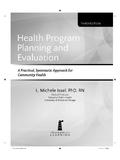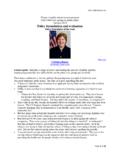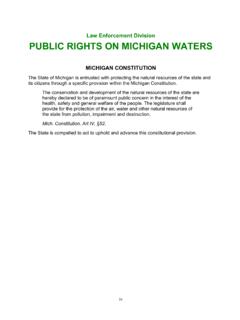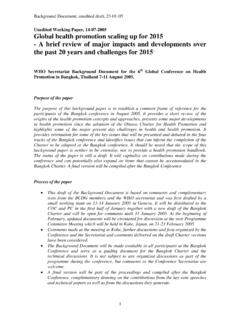Transcription of Definition of primary health care - Western University
1 TUTOR-PHC 2003/2004 RESEARCH TRAINEES NO COOKIE-CUTTER RESPONSE CONCEPTUALIZING primary health CARE1 R. Thomas-MacLean, D. Tarlier, S. Ackroyd-Stolarz, M. Fortin, M. Stewart Short Definition of primary health care : A Transdisciplinary Understanding of primary health care (PHC) acknowledges the role of health care providers from diverse disciplines, within a philosophy and framework of PHC that is guided by the principles of access, equity, essentiality, appropriate technology, multisectoral collaboration, and community participation and empowerment (WHO, 1978). A PHC philosophy recognizes that health and health services occur within particular physical environments and their historical, socio-political, economic, and cultural contexts that shape the social determinants of health for individuals, families, groups, communities, regions, or countries.
2 Each discipline contributes to health and health services delivery within a PHC model, both in a unique sense, and through collaborative interdisciplinary practice. Indeed, as constructed to address numerous principles and contexts, the components of PHC can vary tremendously. As Calman and Rodger (2002) note, primary health care cannot exist as a cookie-cutter response to health issues. Moreover, a consensus process engaged in by Haggerty et al.(2007) resulted in 25 operational definitions of primary care attributes, thereby suggesting that the task of conceptualizing PHC is not an easy one. Conceptual Definition of primary health care : primary health care primary health care (PHC) is a conceptual model which refers to both processes and beliefs about the ways in which health care is structured.
3 PHC encompasses primary care , disease prevention, health promotion, population health , and community development within a holistic framework, with the aim of providing essential community-focused health care (Shoultz & Hatcher, 1997; World health Organization [WHO], 1978). The cornerstones of PHC are access, equity, essentiality, appropriate technology, multisectoral collaboration, and community participation and empowerment (WHO). primary care primary care is a constituent of PHC: While primary care is distinct from PHC, the provision of essential primary care is an integral component of an inclusive PHC strategy (Tarlier, Johnson & Whyte, 2003, p.)
4 180). The 1978 WHO statement on PHC supports a vision of essential and accessible primary care that meets the personal health needs of individuals and families (Institute of Medicine, 1994), as an integral strategy within a comprehensive framework of primary health care . The Institute of Medicine describes PHC as: ..the provision of integrated, accessible health care services by clinicians who are accountable for addressing a large majority of personal health care needs, developing a sustained partnership with patients, and practicing in the context of family and 1 Portions of this paper were based on the work of Denise Tarlier, (2001) Voices from the wilderness: an interpretive study describing the role and practice of outpost nurses.
5 Unpublished masters thesis. University of British Columbia, Vancouver, BC. community.[5] This Definition builds on earlier definitions by the IOM and others. It also recognizes the greater complexity of health care delivery in an era of rapid and profound changes--marked by the development of increasingly integrated health care systems--and the greater interdependence of health care professionals in the provision of health services. Despite numerous documents oriented toward defining primary care , Hogg et al. (2007) conclude that it is in a state of evolution. New definitions of primary care draw upon interdisciplinary perspectives ( , Hogg et al.)
6 , 2007), but there appears to be some consensus that primary care is the first level of contact of individuals and families with the national health system, bringing health care as close as possible to where people live and work. primary care constitutes the first element of a continuing health care process that may also include the provision of timely and appropriate secondary and tertiary levels of care , but it is important to note that the IOM suggests timing ( , conceiving of primary care as the entry point to the larger health care system) could lead to rigid conceptualizations. Instead, the IOM states that chief, principal or main are preferred descriptors.
7 health PHC is rooted in contemporary conceptualizations of health as a bio-psycho-social phenomenon and not simply the absence of disease (WHO, 1978). A PHC orientation to health services delivery recognizes individual, family, community and population experiences of health and illness, as well as the ways in which health and health care are situated within specific social, historical and political contexts. This orientation to PHC is situated within shifting paradigms of health and illness, particularly in Canada, as illustrated by Thomas-MacLean and Poudrier: new strategies for understanding the broader and contextual factors associated with power and community in health and illness have emerged.
8 In a strategy geared toward self-determination in the First Nations, the National Aboriginal health Organization (NAHO) has developed the Regional Longitudinal health Survey (RHS). The experiences of marginalized peoples have contributed to more robust conceptualizations of health . Thus, efforts to improve health should draw upon the knowledge of each of the health professions, as well as knowledge situated in cognate disciplines and the various other stakeholders in healthcare, thereby creating a dynamic dialogue that is reflective of the vitality of interdisciplinary efforts. PHC forms an integral part of the country s health system.
9 While the main focus of PHC is the health of individuals, families, and communities, PHC is equally concerned with addressing the overall social and economic development of communities, thereby targeting the social determinants of health . PHC embodies a spirit of self-reliance and self-determination (Vukic & Keddy, 2002); it is driven by and implies community empowerment and building community capacity and resilience: The fundamental premise of [community development] is that when people are given the opportunity to work out their own problems, they will find solutions that will have a more lasting effect than when they are not involved in such problem-solving (Lindsey, Sheilds & Stajduhar, 1999, p.)
10 1240-1241). Thus, PHC implies essential community-based health care that a) is universally accessible to individuals, families, groups, communities and populations; b) is driven by community participation in identifying health issues; c) involves community participation in decision-making regarding appropriate solutions; and d) is sustainable by the community. The philosophical underpinnings of PHC direct attention to both the art and science of patient-centred primary care , while recognizing that the relationship between health and health care is not always reflective of a linear progression through various stages of illness and treatment.








